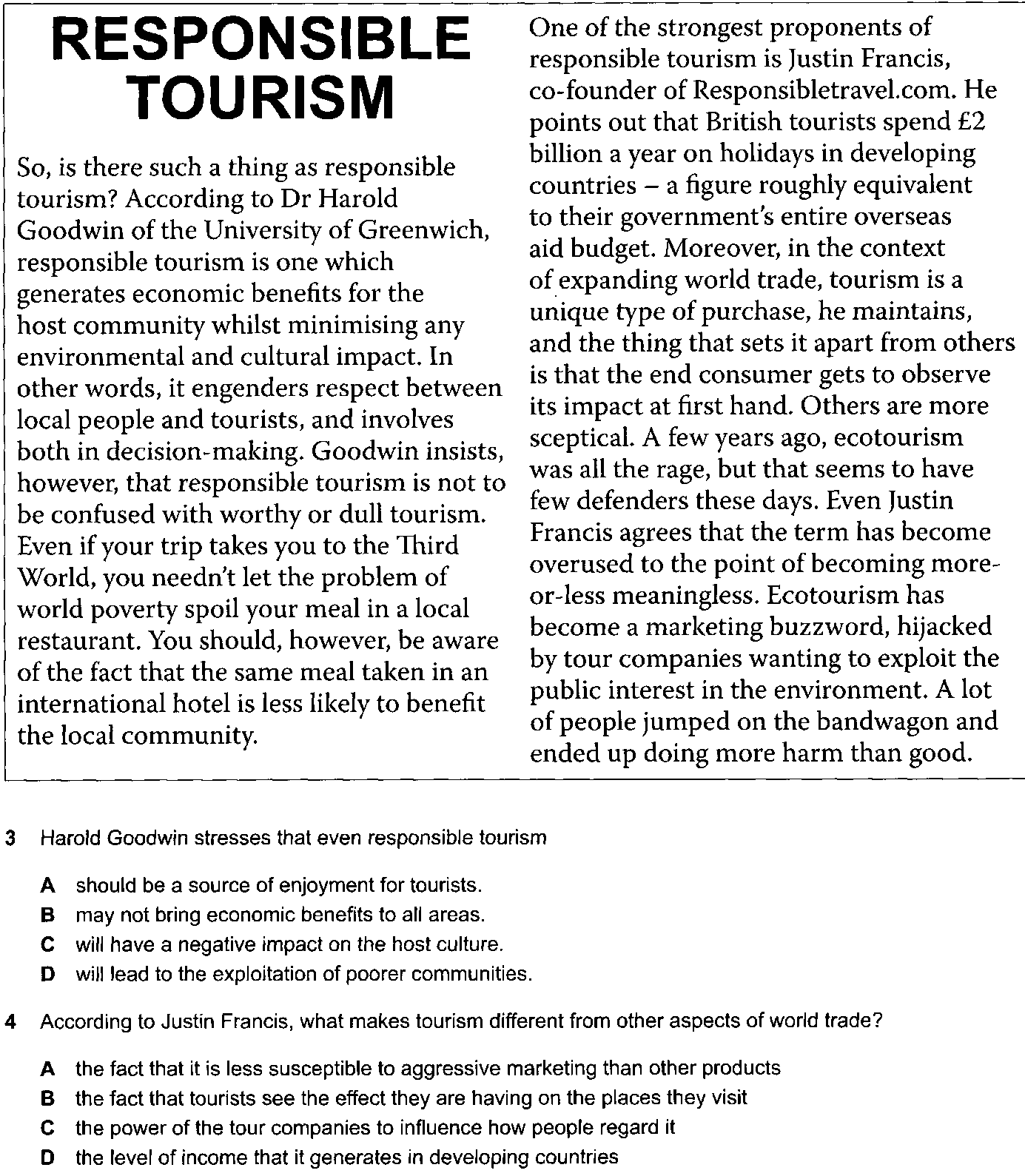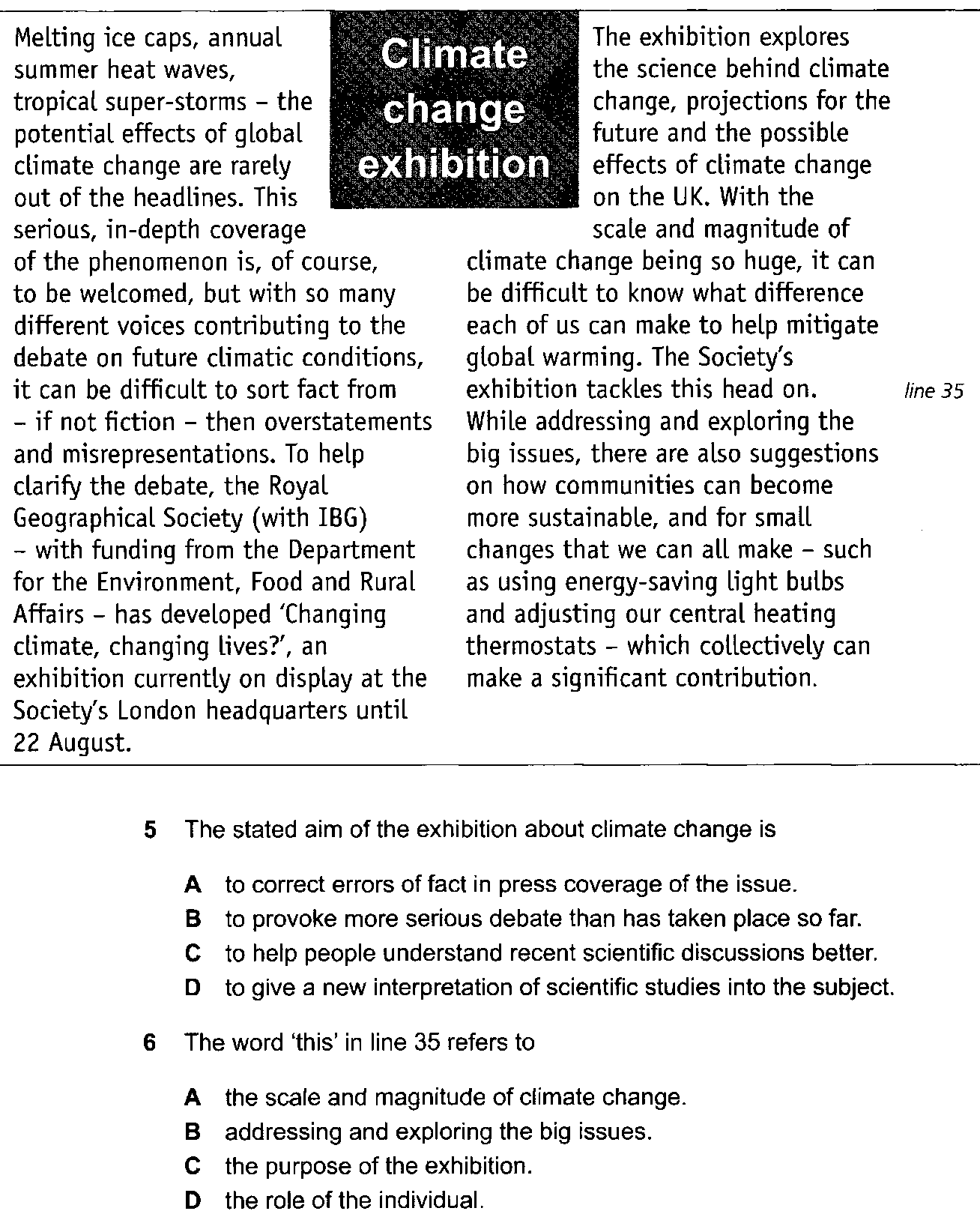
- •Розділ 1
- •Should I stay or should l go?
- •1. The writer suggests that tourists are
- •2. Patricia Barnett's main point is that tourism
- •Why not let nature speak for itself?
- •7. The stated aim of the exhibition about climate change is
- •8. The word 'this' in line 35 refers to
- •Should I stay or should I go?
- •Football as an art form
- •A shirt of two sports
- •A question of safety
- •Розділ 2
- •68. The aim of theoretical grammar is … .
- •69. Language in the narrow sense of the term (‘langue’) is:
- •70. Prescriptive Grammar can be described as follows:
- •70. Grammar does not study … .
- •72. Structuralism can be described as follows:
- •Розділ 3
- •156. Предмет психолінгвістики – це:
- •157. Ментальний лексикон – це:
- •158. Метод семантичного диференціалу – це:
- •159. Мета психолінгвістики – це:
- •160. Ментальний лексикон – це:
- •161. Ознаковий підхід до розуміння значення слова – це:
- •162. Прикладний аспект психолінгвістики – це:
- •163. Ментальний лексикон – це:
- •164. Параметричний підхід до розуміння значення слова – це:
- •Розділ 4
- •177. Визначити, який алгоритм представлений у вигляді наступного словесного запису:
- •178. Задано вираз на мові Pascal:
- •179. Дано фрагмент Pascal-програми:
- •182. Визначити тип алгоритму, представленого у вигляді наступного словесного запису:
- •183. Задано вираз на мові Pascal:
- •184. Дано фрагмент Pascal-програми:
- •186. Надана квадратна матриця ; . Визначити, що виводиться у наступному фрагменті Pascal-програми:
- •187. Визначити тип алгоритму, представленого у вигляді наступного словесного запису:
- •188. Задано вираз на мові Pascal:
- •189. Дано фрагмент Pascal-програми:
Розділ 1
Reading
Read the text and choose the answer (A, B, C, or D) which you think fits the best.
Should I stay or should l go?
Taking a holiday is no longer a matter of just packing a sunhat and heading for the beach. From transport pollution to the impact on local communities, today's tourist can no longer ignore a whole raft of ethical concerns that must be considered before any booking is made. And, of course, tourism does have its environmental cost; by definition tourism involves travel, and air travel is the most polluting form of transport most people will ever use. Long-haul flights release tonnes of greenhouse gasses into the atmosphere for each passenger they carry.
But that's not all. Patricia Barnett, director of the organization Tourism Concern, points out that in a world where only 3.5 percent of people have travelled to another country, there is something in the essence of tourism itself that highlights inequality. Growing tourism to developing countries means that the quarter of the world's population which lives in the north not only consumes 80 percent of the world's resources, but is now travelling to the south and consuming the other 20 percent as well. So perhaps tourism is, in itself, a display of conspicuous consumption — something which poor people can aspire to, but are unlikely to attain.
1. The writer suggests that tourists are
a) largely unconcerned about the environmental consequences of travel.
b) increasingly aware of the ethical arguments surrounding tourism.
c) willing to pay the price of the environmental damage they cause.
d) mostly indifferent to the needs of the communities they visit.
2. Patricia Barnett's main point is that tourism
a) represents a waste of the developed world's resources.
b) encourages people to make unnecessarily long journeys.
c) can only be enjoyed by a minority of the world's population.
d) prevents most people enjoying the benefits of international travel.
Reading
Read the text and choose the answer (A, B, C, or D) which you think fits the best.
Why not let nature speak for itself?
The role of the presenter is currently acting as a dead weight on the advance of nature television. What's more, the argument that personable presenters help draw viewers into shows is now outweighed by the fashion for making them the focus of the programmes. This isn't confined to macho croc wrestlers and brainless celebrities looking for a 'green star' on their CVs. One of the most awesome pieces of film ever made of British wildlife — the dusk roosting flights of a million starlings over the Somerset Levels — was all but ruined by the director's insistence on interrupting the geometry of the performance every five seconds with a cut-in of the presenter waving his arms as if he were conducting them, or as if we were incapable of knowing how to respond without a presenter's cues.
Fortunately, it's now possible to watch this sequence uninterrupted - in an advertisement whose producers seem to have a more respectful opinion of the public's visual sophistication. Director Anthony Minghella, chair of the British Film Institute, has warned that film-makers persistently underrate the visual competence of a generation of viewers growing up with digital cameras and YouTube. The natural world — with its fuzzy logic, ceaseless improvisations and multiple circular storylines — is an obvious subject for new interpretations. John Clare made this leap in nature poetry 150 years ago. It's about time we had a go with film.
3. In the first paragraph, the writer is suggesting that television presenters on nature programmes
a) mislead the public with inaccurate commentaries.
b) are mostly uninformed about the issues dealt with.
c) distract viewers from the power of the visual images.
d) help a wider public understand the issues under discussion.
4. The writer mentions a poet in the second paragraph to show how
a) behind the times nature programmes are.
b) flexible nature programme makers need to be
c) dull nature programmes have tended to become.
d) effective a new approach to nature programmes could be.
Reading
Read the text and choose the answer (A, B, C, or D) which you think fits the best.

5. Harold Goodwin stresses that even responsible tourism
a) should be a source of enjoyment for tourists.
b) may not bring economic benefits to all areas.
c) will have a negative impact on the host culture.
d) will lead to the exploitation of poorer communities.
6. According to Justin Francis, what makes tourism different from other aspects of world trade?
a) the fact that it is less susceptible to aggressive marketing than other products
b) the fact that tourists see the effect they are having on the places they visit
c) the power of the tour companies to influence how people regard it
d) the level of income that it generates in developing countries
Reading
Read the text and choose the answer (A, B, C, or D) which you think fits the best.

